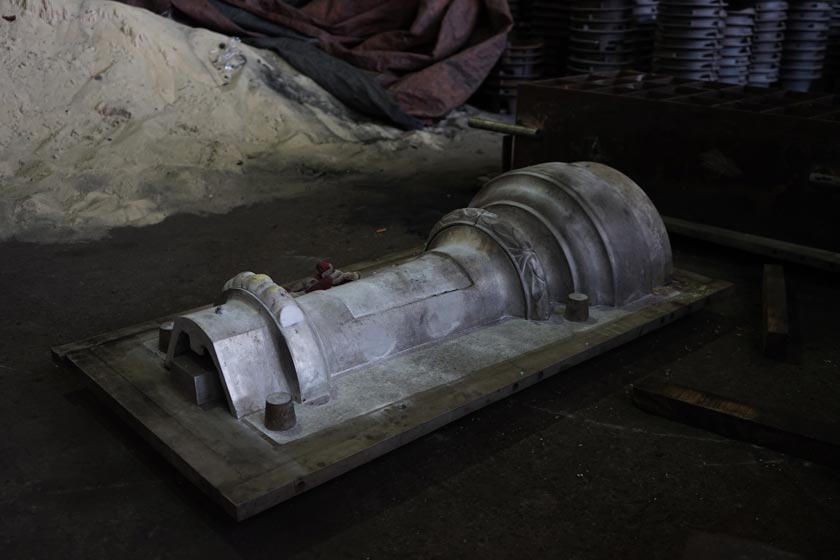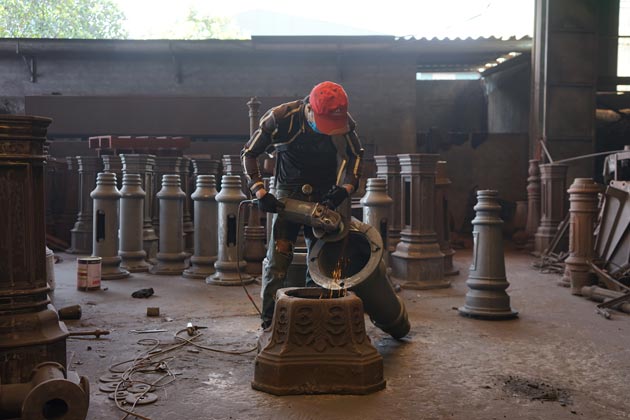Understanding the Perks and Innovations in the Aluminum Foundry Industry
The Aluminum Foundry market plays an essential role in modern manufacturing. Its light-weight residential properties notably enhance gas effectiveness, especially in aerospace and vehicle sectors. In addition, Aluminum's resistance to deterioration warranties long life in various applications. As the market develops, developments such as advanced recycling and additive manufacturing are improving production methods. Checking out these improvements discloses not just the benefits but additionally the challenges ahead for Aluminum factories in a quickly changing market.
The Lightweight Benefit of Aluminum
Aluminum's lightweight nature uses significant advantages throughout various industries, especially in production and transportation. Its reduced density enables for the production of components that are much easier to set up and take care of, resulting in minimized labor expenses and boosted performance. In the automobile field, lighter lorries add to enhanced fuel economic situation and lower discharges, straightening with global sustainability objectives. In aerospace, the use of Aluminum minimizes the total weight of aircraft, which is vital for enhancing efficiency and lowering functional expenses.
In addition, Aluminum's light-weight properties help with innovative styles that were formerly unfeasible with heavier materials. This versatility allows manufacturers to develop complicated shapes and structures while keeping architectural integrity. On the whole, the light-weight advantage of Aluminum not just boosts item efficiency yet also drives advancements in technology and design, making it a recommended product in different applications.
Rust Resistance and Durability
The Aluminum Foundry market is renowned for generating products with premium rust resistance, making them perfect for numerous applications. This residential property, incorporated with enhanced structural honesty, adds to the lasting performance benefits that Aluminum components use. Consequently, industries increasingly depend on Aluminum to meet requiring ecological problems without jeopardizing top quality.
Superior Rust Resistance
While various steels face considerable difficulties from ecological factors, Aluminum stands apart for its premium rust resistance, making it a recommended selection in many applications. This residential or commercial property is largely due to a natural oxide layer that bases on the Aluminum surface, supplying an obstacle versus moisture and corrosive representatives. Unlike other metals that might corrosion or degrade over time, Aluminum maintains its stability even in severe environments, such as coastal areas or commercial setups. In addition, its lightweight nature combined with deterioration resistance makes it excellent for applications in aerospace, auto, and aquatic sectors. Generally, Aluminum's exceptional durability not only boosts item longevity yet additionally minimizes maintenance prices, providing a compelling benefit for customers and producers alike.
Enhanced Architectural Integrity
Designers and designers increasingly recognize the relevance of improved architectural integrity in contemporary applications, where both deterioration resistance and longevity are essential. Aluminum alloys, recognized for their light-weight homes, also display remarkable resistance to deterioration, making them appropriate for rough atmospheres. The cutting-edge techniques utilized in the Aluminum Foundry market add significantly to generating components with improved longevity. Advanced casting processes and alloy structures are tailored to fulfill specific performance demands, making certain that structures can stand up to severe conditions without jeopardizing honesty. Surface area therapies and coatings enhance the life expectancy of Aluminum products, even more reducing degeneration over time. This emphasis on enhanced structural stability not only prolongs the use of materials however likewise minimizes upkeep prices, strengthening Aluminum's placement as a material of option in different markets.
Lasting Performance Benefits
Long-lasting efficiency in Aluminum parts is mainly connected to their premium deterioration resistance and longevity. Unlike many metals, Aluminum normally develops a safety oxide layer, which protects against corrosion and damage in numerous environments, including aquatic and industrial settings. This fundamental building significantly extends the lifespan of Aluminum items, reducing upkeep and substitute costs. Additionally, the lightweight nature of Aluminum enhances its applicability throughout markets without compromising strength. The material's resistance to put on and tear likewise adds to its integrity popular applications, making it an excellent selection for vehicle, aerospace, and construction industries. As markets significantly focus on sustainability and long life, Aluminum's performance advantages align with modern-day design needs, strengthening its role in cutting-edge manufacturing processes.
Ecological Effect and Sustainability
 As the Aluminum Foundry sector develops, it significantly prioritizes environmental influence and sustainability, acknowledging the demand for responsible techniques in the face of climate modification. Efforts to lessen waste and power intake go to the forefront, with lots of shops adopting recycling initiatives to recover Aluminum scrap. This not only lowers basic material use but likewise significantly reduces energy expenditure, as recycled Aluminum needs just a my website portion of the energy compared to main manufacturing.
As the Aluminum Foundry sector develops, it significantly prioritizes environmental influence and sustainability, acknowledging the demand for responsible techniques in the face of climate modification. Efforts to lessen waste and power intake go to the forefront, with lots of shops adopting recycling initiatives to recover Aluminum scrap. This not only lowers basic material use but likewise significantly reduces energy expenditure, as recycled Aluminum needs just a my website portion of the energy compared to main manufacturing.Innovations in exhausts regulate innovations are being carried out to reduce air contaminants, lining up procedures with more stringent ecological guidelines. Factories are also exploring alternative power resources, such as solar and wind, to power their centers sustainably. By cultivating partnership with stakeholders, the industry aims to create ingenious options that improve ecological stewardship. Jointly, these campaigns highlight a commitment to decreasing the Aluminum Foundry's carbon footprint while advertising a circular economy within the production industry.
Advanced Manufacturing Techniques
 Reinventing manufacturing processes, the Aluminum Foundry sector is progressively incorporating sophisticated manufacturing strategies to improve performance and precision. Techniques such as computer system numerical control (CNC) machining and additive production have become necessary components in enhancing manufacturing process. CNC machining enables high-precision element fabrication, substantially minimizing material waste and production time. At the same time, additive manufacturing opens up new opportunities for intricate geometries and lightweight styles that were previously challenging to attain.
Reinventing manufacturing processes, the Aluminum Foundry sector is progressively incorporating sophisticated manufacturing strategies to improve performance and precision. Techniques such as computer system numerical control (CNC) machining and additive production have become necessary components in enhancing manufacturing process. CNC machining enables high-precision element fabrication, substantially minimizing material waste and production time. At the same time, additive manufacturing opens up new opportunities for intricate geometries and lightweight styles that were previously challenging to attain.Furthermore, the release of automation and robotics in Aluminum factories streamlines operations, lessens human mistake, and boosts worker safety and security. These technologies help with an even more receptive production environment, allowing makers to adjust quickly to market demands. The combination of sophisticated simulation software application better boosts the design and testing phases, causing superior product quality. Collectively, these techniques not just improve operational efficiency however additionally foster development, positioning the Aluminum Foundry industry at the forefront of modern-day production.
Innovations in Recycling Processes
The Aluminum Foundry industry is not only progressing in making methods however is likewise making considerable strides in recycling procedures. Advancements are arising to enhance the efficiency of reusing techniques, decreasing energy consumption and boosting sustainability. Advanced arranging innovations, such as automatic optical sorting, allow the identification and splitting up of Aluminum from various other materials with high accuracy. This causes a greater quality of recycled Aluminum, which is crucial for preserving the integrity of the basics end products.
Moreover, closed-loop recycling systems are being carried out, permitting producers to reuse Aluminum scrap within their very own production procedures. This reduces waste and advertises a circular economic situation. In addition, research right into new recycling methods, such as hydrometallurgical procedures, provides the potential for recovering Aluminum from intricate waste streams. These advancements not only add to decreasing the carbon impact of the Aluminum Foundry sector but additionally reinforce its financial viability in a significantly environmentally aware market.
Applications Throughout Different Industries
Numerous markets are progressively recognizing the adaptability and advantages of Aluminum Foundry products, causing prevalent applications across markets such as automobile, customer, building and construction, and aerospace goods. In the automobile market, Aluminum spreadings add to light-weight vehicle designs, improving gas performance and performance. Aerospace manufacturers utilize Aluminum components for their strength-to-weight proportion, necessary for airplane frameworks and parts.
In construction, Aluminum is preferred for its sturdiness and resistance to rust, making it ideal for window frames, roofing, and architectural assistances. Consumer goods also profit from Aluminum Foundry items, as seen in cookware, electronic devices, and product packaging, where light-weight and recyclable materials are crucial.
The flexibility of Aluminum Foundry strategies enables for accurate specifications and intricate designs, catering to the varied requirements of these markets. Because of this, Aluminum Foundry products are becoming integral to modern-day manufacturing processes across numerous fields.
Future Patterns in Aluminum Foundries
As industries proceed to develop, Aluminum foundries are positioned to accept several essential fads that guarantee to enhance performance and sustainability. One noticeable fad is the boosting adoption of electronic technologies, consisting of automation and man-made intelligence, which enhance procedures and improve high quality control. On top of that, the press in the direction of lasting techniques is leading factories to spend in recycling technologies, considerably reducing waste and power consumption.
 Another arising fad is the use of advanced alloys and materials, satisfying the growing demand for durable and lightweight elements throughout different sectors (Aluminum Foundry). In addition, the integration of additive manufacturing methods is expected to revolutionize part style, using customization and minimizing preparations
Another arising fad is the use of advanced alloys and materials, satisfying the growing demand for durable and lightweight elements throughout different sectors (Aluminum Foundry). In addition, the integration of additive manufacturing methods is expected to revolutionize part style, using customization and minimizing preparationsCollaboration with research institutions is also expected to drive advancement, as shops look for to create brand-new procedures and materials. Aluminum Foundry. Collectively, these trends indicate a transformative future for the Aluminum Foundry industry, aligning with wider goals of sustainability and efficiency
Frequently Asked Questions
What Are the Normal Expenses Linked With Aluminum Foundry Manufacturing?
The normal expenses connected with Aluminum Foundry production consist of raw products, labor, energy, equipment maintenance, and overhead costs. These aspects jointly affect the total economic investment needed for effective Aluminum casting procedures.
Just How Does Aluminum Contrast to Other Metals in Toughness?
Aluminum, while lighter than several metals, exhibits impressive strength-to-weight ratios. Compared to steel, Aluminum is less solid but provides exceptional corrosion resistance, making it a beneficial choice in applications where weight and sturdiness are vital.
What Precaution Remain In Location in Aluminum Foundries?
Precaution in Aluminum foundries typically consist of necessary personal safety tools, air flow systems to control fumes, normal devices upkeep, training programs for employees, and adherence to rigorous safety and security policies to decrease risks associated with liquified metal handling.
Exactly How Is Quality Assurance Managed in Aluminum Spreading Processes?
Quality control in Aluminum spreading processes includes strenuous evaluations at numerous stages, consisting of basic material analysis, procedure monitoring, and last product testing. Techniques such as analytical process control and non-destructive screening warranty adherence to industry criteria.
What Certifications Are Necessary for Aluminum Foundry Providers?
The value of accreditations for Aluminum Foundry suppliers includes ISO 9001 for top quality management, ISO 14001 for environmental management, and industry-specific requirements like ASTM and SAE, making certain compliance, security, and integrity in producing procedures.
The this website Aluminum Foundry industry plays a necessary duty in contemporary production. The Aluminum Foundry industry is renowned for producing materials with remarkable deterioration resistance, making them suitable for numerous applications. Revolutionizing production processes, the Aluminum Foundry market is increasingly integrating sophisticated manufacturing methods to improve efficiency and accuracy. The Aluminum Foundry industry is not only advancing in producing methods however is likewise making considerable strides in reusing procedures. As sectors proceed to evolve, Aluminum foundries are poised to embrace several vital trends that promise to enhance efficiency and sustainability.